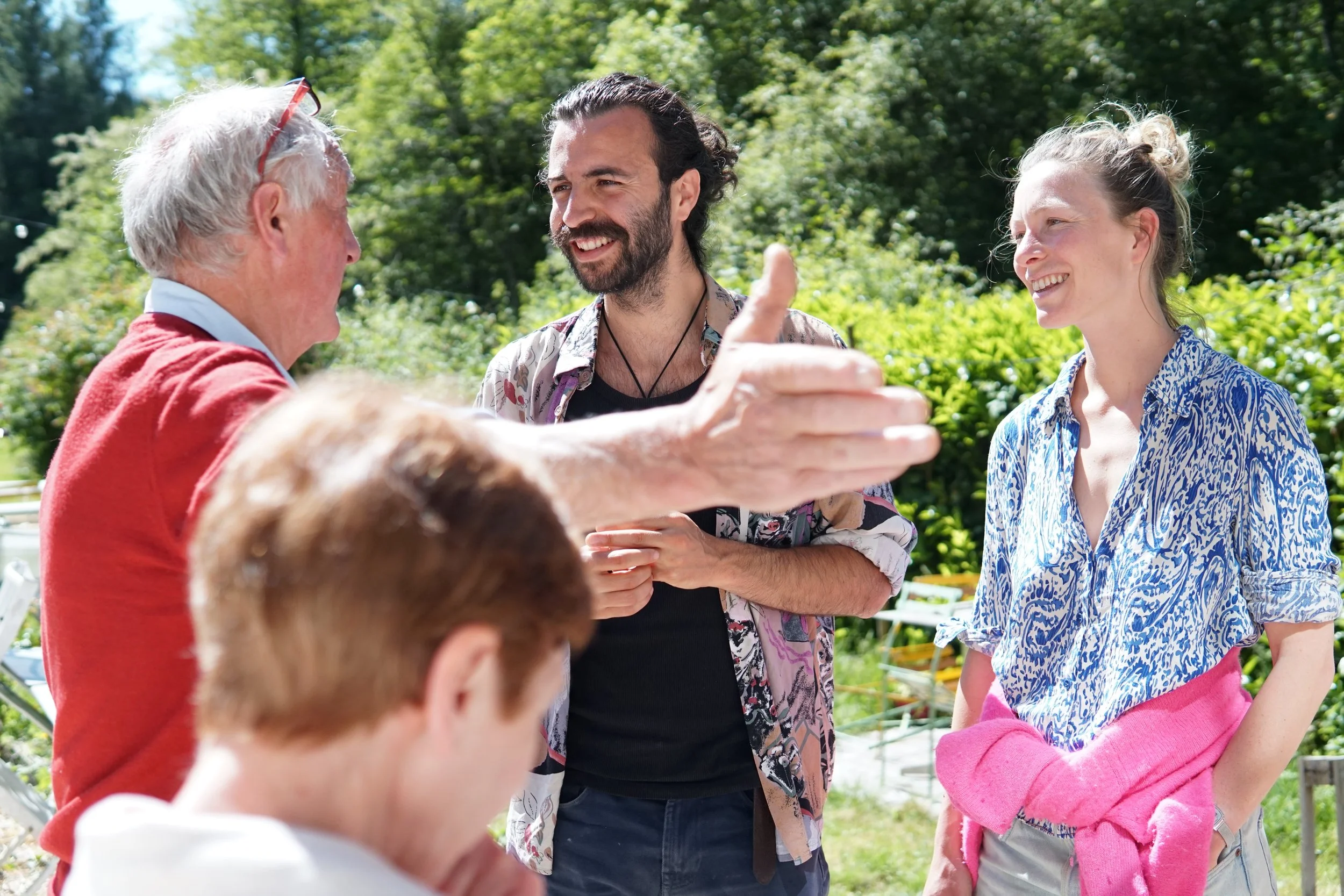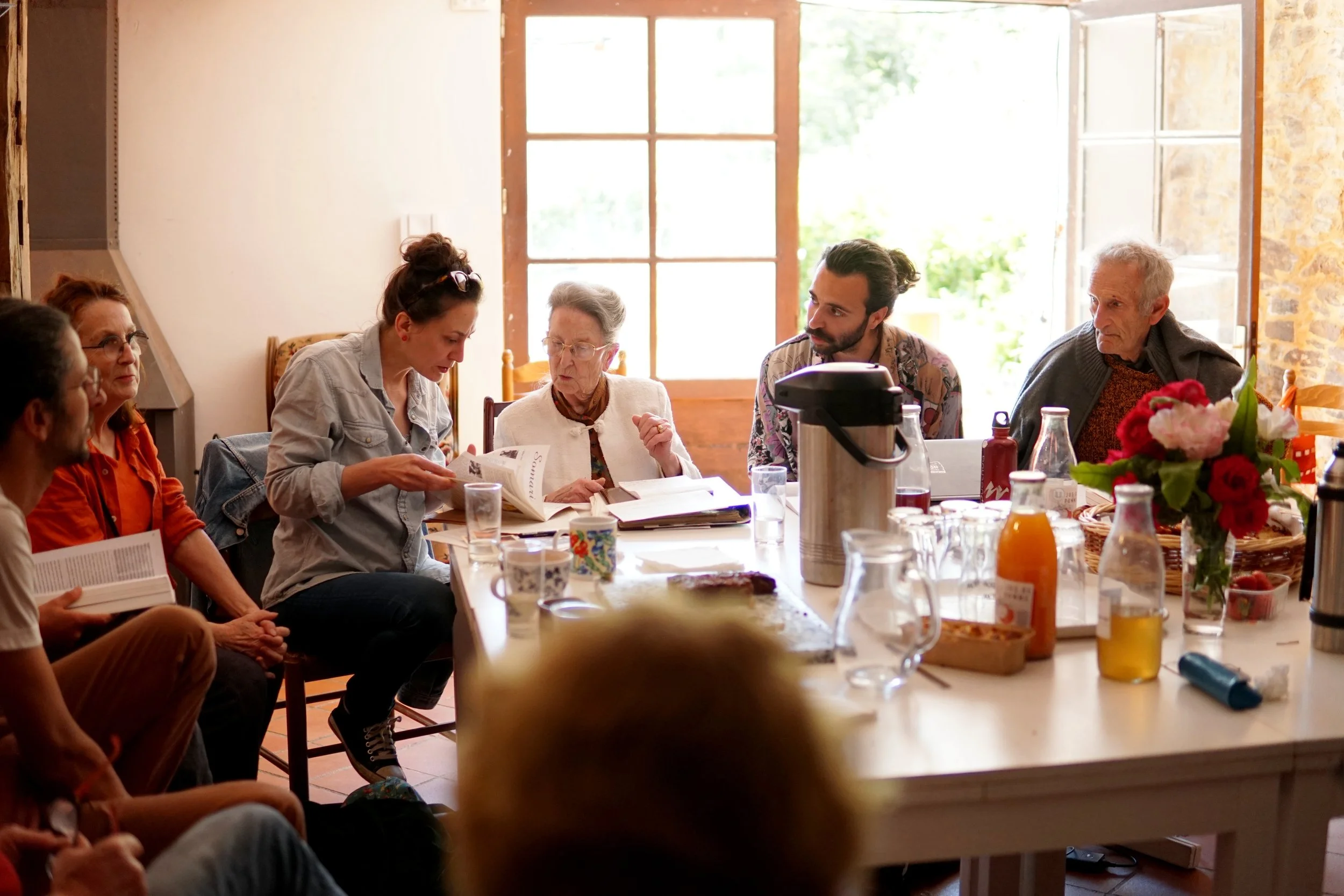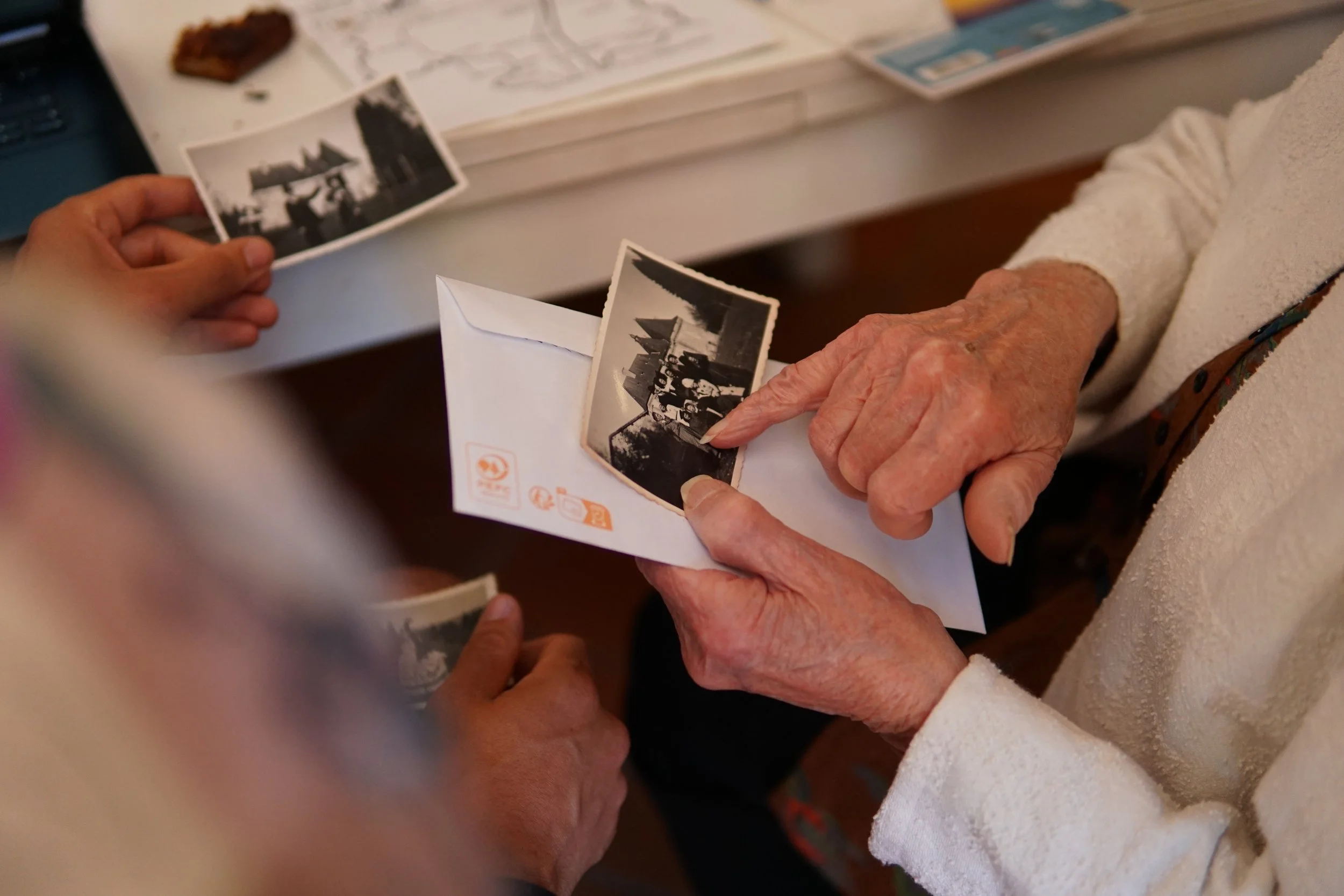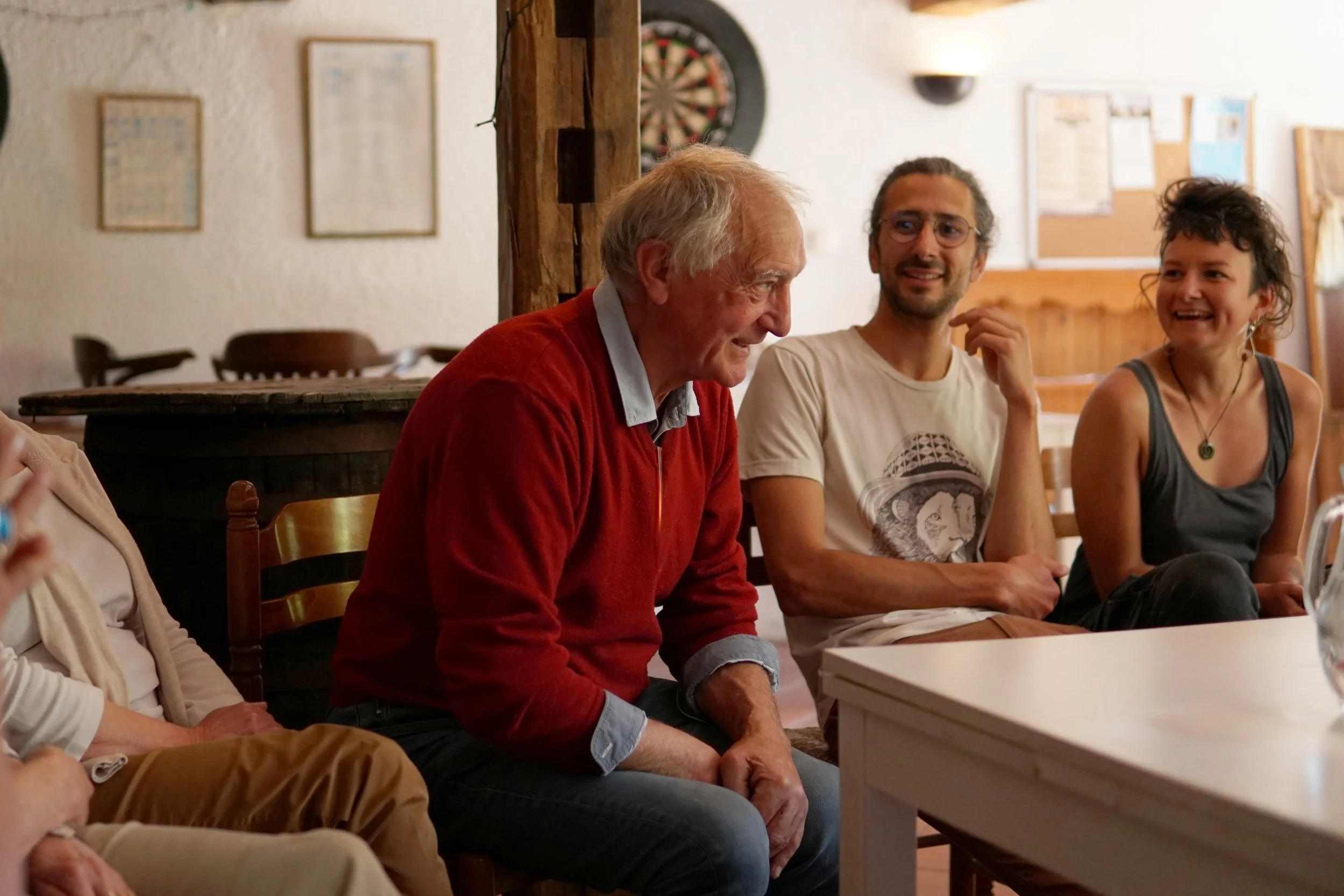Network Catalyzers alexandra georges-picot and Xavier Arrateig on Les Goûters Historiques de Chalais
alexandra georges-picot is a community-based researcher and grassroots organizer passionate about pedagogy, movement, and memory. With a Master's degree in History from the University of Oxford, where she specialized in oral and agricultural history, she works at the intersection of embodied learning, rural life, and intergenerational storytelling. Her practice explores how shared narratives and artistic practices can foster belonging, especially in contexts marked by collective grief and social fragmentation.
Xavier Arrateig has extensive experience in community building and bridging practices. He co-founded an association focused on ecological education, organizing monthly sessions that promoted environmental awareness and reconnecting people to ecological principles. Xavier also initiated Le Jardin des Dingues, a self-managed, participatory festival where attendees contribute to all aspects of the event—food, camping, culture, logistics—creating an immersive environment that fosters connection and collaboration among diverse individuals. Additionally, Xavier co-founded Le Cocon des Canailles, which includes La Guinguette du Touroulet, a community café serving as a local empowerment hub. Through workshops on non-violent communication, conflict resolution, and theater in schools, he creates opportunities for people to work together, build trust, and strengthen their sense of belonging.
Ruby Devoe, the Democracy and Belonging Forum’s summer intern, is a student and writer interested in political ecology, journalism and radio broadcasting. She is currently working on a thesis about social ritual and subcultural space within the neoliberal urban environment, and writing a series of short speculative fiction stories about distraction, ghosts and other hauntings. She also hosts the show Elsewhere at the 90mil community radio in conversation with grassroots political activists in Berlin.
Ruby recently spoke with Network Catalyzers alexandra and Xavier about their journey with Les Goûters Historiques (The Historical Gatherings), the experiences that shaped their work, what they’ve learned, and the challenges they continue to navigate in building community.
What specific challenge or opportunity related to othering, belonging, bridging, and/or democracy are you exploring through this community? How does your work help advance democracy rooted in belonging within your local or regional context?
This project, led by Forum member alexandra georges-picot in partnership with Xavier Arrateig, co-founder of the community café La Guinguette du Touroulet and local non-profit Le Cocon des Canailles, seeks to bridge divides in the rural, post-industrial Northern Dordogne. Using the café as a gathering place, it creates opportunities for intergenerational, politically and culturally diverse connections rooted in shared histories and mutual attachment to place.
At its heart is a monthly Goûter — an afternoon tea where elders and younger generations meet. Elders share life histories, knowledge of the landscape, and memories of the villages. The aim is to uncover stories that have shaped the territory and explore how they connect to our shared present. These dialogues build empathy and understanding, moving beyond political and cultural divides.
In Chalais and Saint-Jory-de-Chalais, where the initiative takes root, community bonds are under strain. Far-right support is significant — 40% of the recent vote went to the Rassemblement National (RN), and three of four districts are now RN-held (compared to one before 2024). Meanwhile, neo-rural newcomers arrive with ecological or artisanal projects, often bringing progressive values and aesthetics that feel alien to long-established residents.
Long-rooted inhabitants, many of whom have run local businesses and kept traditions alive, feel increasingly sidelined. Younger locals often migrate to cities, leaving behind an aging population afraid of being replaced by newcomers who seem detached from local heritage. This deepens the rift, with elders experiencing a sense of estrangement and the need to fight for belonging.
The Goûters offer a space to meet around tangible concerns and shared experience. As Krista Tippett says: “I can disagree with your opinion, but I can’t disagree with your experience.” Focusing on lived experience — the history of the land, keeping schools open, access to public services — helps shift from opposition to common ground.
What led you to engage in this work? What hopes or intentions did you have at the start, and how have they evolved over time?
This work began with a mix of curiosity, love for this place, and awareness of a tension. As young, progressive, eco-minded newcomers, we knew our presence could feel like cultural displacement. In cities, it might be called gentrification; here, it can feel like a quiet colonisation — newcomers bringing values and rhythms foreign to people rooted here for generations.
We wanted neighbours, not just like-minded friends, and to weave ourselves into a web of mutual support grounded in the lived experience of the land: its weather, fields, seasons, and human histories. This wasn’t about “doing the right thing” as activists, but about recognising what makes life possible in a place. Practical, place-based knowledge — how to fix a bread oven, when the river floods, where the old paths run — shapes livelihoods.
One early turning point came when we discovered a traditional wood-fired oven in the historic watermill that houses our café. We didn’t know how to use it, so we asked neighbours. They shared not only techniques but the story of how the mill clandestinely milled flour during WWII. The oven wasn’t just a tool — it was a keeper of resilience. Encounters like this showed us that the wisdom we need is already here.
From the start, much of the work has been in the preparation. Before each Goûter, Xavier spends days going door-to-door, visiting elders who might hold stories on the month’s theme. He records conversations, honours their home archives, and lets their perspectives shape the gathering. This step builds trust and ensures the stories shared are rooted in relationship.
Our original format — formal “sharing circles” — loosened over time. While the circle broke the ice, the richest stories emerged outside it: during a snack break, before we began, or while shelling walnuts. More and more, we follow locally rooted ways of gathering — the veillée, the apéro, the work-bee — letting the format grow from what’s already alive here.
What kinds of transformations — personal, relational, or collective — have you witnessed within the community? Is there a moment or memory from the past year that stands out — a time when the work felt especially meaningful, a moment of connection, or a significant challenge?
In April, after a Goûter on schooling across generations and our village school, the local teacher who had attended the gathering reached out to Xavier and me. She asked us to run a day-long workshop on intergenerational storytelling at the school. She wanted her pupils to meet Colette, a village elder whose story she had heard at the Goûter. Colette had entered the same school in 1936 and was full of lively memories about the war and schooling in the 1930s and 1940s. She joined us for a very successful storytelling day on Armistice Day in early May.
In June, some of the regular elders heard that a group of newcomers were planning an arts festival on the same day as the village’s annual farm culture celebration. They were frustrated that this new event had been scheduled by the “gentrifying progressives” without prior consultation with the “people” of the village, and worried about competing for attendance. They came to Xavier and me to talk it through. Although we may still be “the hippies” in their eyes, the time spent together at the Goûters has turned us into possible allies — go-betweens able to mediate between longstanding residents and newer, more progressive arrivals. The shift from private grievance to open conversation felt like a sign of trust.
Stories have also opened space for honesty. While preparing a Goûter on village celebrations, Xavier visited Patricia — once a local communist leader — with Robert, a history-loving elder. Mid-conversation, Patricia said, “You know, Robert, I never voted for you.” They both laughed. It was the first time they had spoken so directly about their politics. The Goûter doesn’t erase their differences — but it reminds them that they are united in sharing a story worth transmitting to us, and that these stories will continue to live on in young people’s memories.
Before our last summer gathering, we invited everyone to see a documentary made by one of the participants, Sara, about her grandmother Colette’s artisanal practice and the transmission of craft across generations. The Goûter was meant to become a space for discussion about the film. The six months of shared familiarity, combined with the collective experience of driving to the screening and watching it together, created an unexpected and joyful ease during the Goûter. Xavier and I barely had to facilitate — conversations flowed as if they had always been going.
How have you co-created this community with others? What roles have participants played in shaping the direction, content, or culture of the space? What have you learned about co-creation through this process?
Participants help us choose the monthly themes, and we spend time with them noticing which stories emerge — the themes that feel most urgent or supportive to meet the present (like when we discussed solidarity in farming and local work). Participants are also the ones who introduce us to other elders who might be interested in a theme and eager to share their stories. Some help us document the gatherings — recording with high-quality audio gear, taking notes, bringing personal archives, or extending our research into local and regional archives.
Xavier’s preparatory work is also deeply collaborative. When he visits elders ahead of each gathering — to invite them in person and listen to their stories — he invites them to co-shape the theme with him, to guide which stories are brought forward and how they are told. This groundwork ensures that when the gathering happens, it already carries the imprint of many voices. Going in person to invite someone to a gathering in rural France is both a traditional gesture and one that has become extremely rare. This personal connection is invaluable; it builds a kind of trust that contrasts with how many elders now encounter younger generations and progressive values — mostly through screens, television, or social media.
We have also learned to honour the forms of gathering that already exist here — the inherited ways of being together across difference and sharing social space. It has deepened our understanding that living together in a village has always meant collaborating and coexisting across difference, despite the relational challenges that arise. While there are still moments of conflict, exclusion, and stigma in rural life, the countryside remains, more often than not, a space of conviviality in spite of difference.
Within our own gatherings, we’ve noticed that some of the most meaningful exchanges happen in the pauses — over cake, leaning on a wall, or during a quiet side conversation. Speaking in a circle is new to most of our older participants; it reminds some of AA meetings or films. The circle helps break the ice, but the moments that precede and follow it — the one-on-one visits and the snack breaks — are where intimacy grows. We’ve gradually decided to facilitate in service of these informal connections, rather than the other way around. Doing things together — crafting, collaborating, working, harvesting — creates bridges across difference. These moments of shared effort bring the satisfaction of having accomplished something together and the trust that comes from mutual support.
We are now reflecting on how to create more of these shared experiences — taking group walks, shelling walnuts together, or going on another trip to the cinema to see a film that sparks common interest.
How do you see your role as a catalyzer of this community? How has your participation in the Network Catalyzers Program supported this work? What have you learned about yourself through this experience?
This project grows from a need that was already present: to create ways of meeting — through narrative infrastructure — that tend to the stories surrounding the “colonization” by neo-rurals, the gentrification of land prices, and the very real fear of a grand remplacement: the replacement of local culture with a globalized, homogenized one. The OBI funding became the spark, giving us both the confidence and the means to begin.
Xavier describes his role simply:
“For me, this project rests on the role of reassuring people through my presence and offering a pretext to create direct social connection — valuing people through what they have to share. Making the gesture of going to see people, in person, who would never come in response to a poster or an email. Going to people physically, knocking on their doors. Differences in lives, values, or ways of doing things are no longer a criterion, no longer a reason for exclusion, when we are together.”
As Maupassant wrote: “To judge is, in any case, not to understand; because if one could understand, one could not judge.” Here, “to understand” becomes “to know” — because once I know you, you lose the identity I had attached to you that made you an enemy or someone to fear.
Part of this work has been about unexpected forms of inclusion. One of the most meaningful shifts for us has been the feeling of becoming “the village fools” rather than “the fools who live next door.”
When Xavier hosted the school kermesse in a dress, laughter and tenderness arose in a context where trans identity can be highly divisive. Similarly, villagers refer to Patricia as “our communist” — teasing her, yes, but with affection, the way an older brother might tease a younger sister while never letting anyone else harm her.
Humour here is a delicate terrain. In progressive spaces, mocking humour is often discouraged because it can perpetuate harm. We recognize the privilege we hold in being able to receive it without collapse — a resilience inherited from our backgrounds and cultivated over time. But in this rural context, teasing can also act as a social glue, a way to soften and move tensions. Like carnival mocking the king, it creates a shared release. If this kind of humour disappears entirely, something essential is lost: the capacity to relate across difference without erasing it.
We are not romanticizing its violence — it can wound — but for those of us who can hold it, there is value in becoming the bridge, the political hinge, the ones who can absorb the joke and respond in kind, turning fear into familiarity.
What’s next for your community? Do you imagine it continuing beyond this program? If so, in what form?
The ripple effects of the Community Gathering project have been remarkable. The mayors of two neighbouring villages have reached out to us, curious about our approach and eager to implement similar monthly gatherings in their own communities in 2026. They have asked us to train both younger and older residents to carry this work forward — an invitation that feels like a sign of trust and a recognition of the value of what has been cultivated here.
We have also received growing attention from French academia: researchers from Rouen, Poitiers, and Bordeaux have come to interview us about our process. Out of these encounters, we hope to create a French online community of bridgers — people committed to building dialogues across difference — with whom we can share reflections, read and think together, and explore humour and storytelling as powerful levers for connection.
Locally, in our founding village, we are building on the narratives gathered through the Goûters to co-write a play for the communities of Chalais and Saint-Jory-de-Chalais, in collaboration with the Amicale Laïque. The play will explore diverse relationships to the land through an intergenerational cast exchanging roles, and will be performed in November 2026. Last year, the Amicale Laïque’s production involved thirty local participants and drew a hundred audience members — significant numbers for villages of 400 and 600 people. We hope for similar engagement, and plan to record the performance for local archives.
The play will not just be a product, but a pretext — an embodied way to create connection through rehearsal, movement, and the shared act of telling each other’s stories. We will seek funding to ensure participation remains free and accessible to all.
Beyond the play, we intend to continue the Goûters as a monthly practice, rooted in the life of the café and the wider cultural fabric of the area. This work is part of a broader vision: developing life story gathering tools that can be shared with other communities — both locally and within the Forum network — as a way to bridge divides through rooted, place-based storytelling.
Editor's note: The ideas expressed in this blog are not necessarily those of the Othering & Belonging Institute or UC Berkeley, but belong to the authors.
Photo credit: Betty Durieux
Explore the Network Catalyzers Program page for more conversations and insights from community leaders supported by this initiative. Click here!




